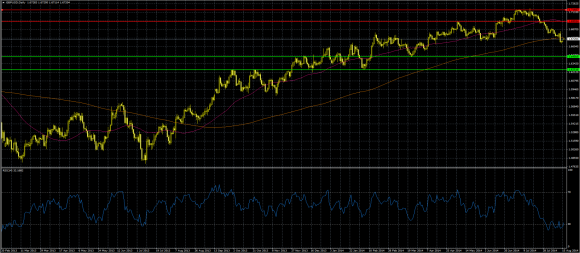
CURRENCY ANALYSIS - GBP/USD OUTLOOK : The BoE's major concern is a lack of wage growth
Mark Carney, Governor of the Bank of England (BoE), turned from a hawkish to dovish tone last week. Just a few weeks back, Mark Carney stated that interest rates could rise later this year. Mark Carney went back on his words and stated there still exists a lot of uncertainty in the UK economy. This led to the decline of the pair from near 6-year highs. Simply put, the market had already priced in an interest rate hike, and the news of Mark Carney's statement destroyed the momentum.
Unemployment has continually been falling (Actual: 6.4%, Forecast: 6.4%, Previous: 6.5%, 03/08/2014) and this data had been adding to the current speculation on an interest rate hike. One of the major concerns that the BoE faces is wage inflation (Average Earnings Index 3m/y, Actual: -0.2%, Forecast: -0.1%, Previous: 0.4%, 12/08/2014), which has been disappointing. The uncertainty Mark Carney is talking about is most likely to be wage inflation. With outstanding growth (Actual: 0.8%, Forecast: 0.8%, Previous: 0.8%, 15/08/2014) and inflation forecasted to be at 1.8%, earnings have declined.
This signals that there is spare capacity in the economy, if wages rise in line with inflation then this could unlock further growth. In addition, Mark Carney's dovish tone may be to talk down the Pound Sterling, as the high Pound Sterling is hurting exporters. We expect the BoE to hold current interest rates at 0.5% at this week's meeting. CPI data (Forecast: 1.8%, Previous: 1.9%, 19/08/2014) this week should provide us with some insight of when the BoE might raise interest rates.
One of the Fed's main concerns should be the consequences when the Fed taper QE on US equity markets (such as the S&P 500). When the Fed stop tapering QE (Quantitative Easing) in October, US equity markets will be hit drastically, the damage could be devastating to the recovery. In addition, interest rates are likely to rise in 2015, although this is dependent on the health of the labour market.
In the last week of June, the unemployment rate had risen by 0.1% and the last few readings of unemployment claims have been lurking in the range of 298K - 311K, suggesting that there still exists spare capacity in the economy. If this slack is cut then we could see the Fed move towards the 2% benchmark inflation rate. We expect the Fed to continue to taper, Janet Yellen (President of the Fed) will reiterate her last message on the interest rate hike being gradual.

The pair had been in an uptrend, reaching near 6-year highs. Currently the pair is trading in a downtrend. We have identified R2 a strong ceiling for the pair, the pair has tested this level twice and the pair has failed to break it. R1 is also a strong ceiling for the pair as it is supported by the 50-day MA (magenta). In addition, it has been tested twice as a resistance during the uptrend prior to a break.
S1 is a strong floor for the pair, it has been tested once and the pair has failed to break this level. S2 is a similar case, it has been tested twice hence, remains a strong secondary floor for the pair.
Technicals: RSI (Relative Strength Index) and MAs (Moving Averages)
- RSI currently in oversold region (<30), there could be a pullback to 1.68560 before continuing the downtrend.
- 50-day MA (magenta) has flattened and 200-day MA (orange) has started to pick up, signalling a bearish stance for the pair in the short term. We could have a bearish crossover in the coming weeks. 50-day MA and 200-day MA will provide additional resistance to the pair.
In the long term, the pair is bearish. As the Fed continues to taper on autopilot, the greenback should become stronger. There exists a divergence between the hawkish view of the committee and the dovish view of the market. The BoE's communication problems are causing a lot of uncertainty in the market, it is likely to continue to do so in the near term depending on data. With wages not rising, this will translate to weaker retail sales and will affect output for the UK.


